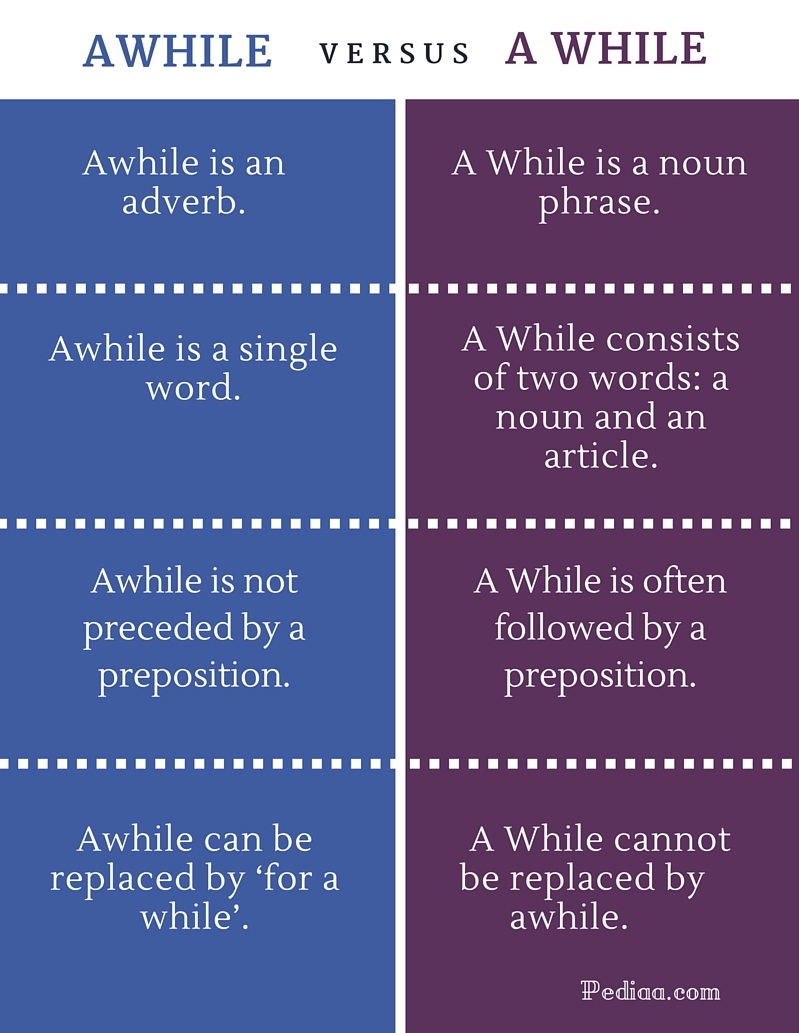Wait a while longer.
Подождите ещё немного.
Tarry with us a while.
Побудь с нами ещё немного.
That year whiled for me.
Тот год показался мне вечностью.
Let’s cruise for a while.
Давай немного прошвырнёмся.
Take a nap while I’m out.
Поспи, пока меня не будет.
It’ll take a little while.
Это займёт немного времени.
Buy now while stocks last!
Покупайте, пока товары есть в наличии!
ещё 23 примера свернуть
Nero fiddled while Rome burned.
We’ll let them sweat a while longer.
She was arrested while on probation.
Can you get me a pop while you’re up?
Driving while intoxicated is illegal.
Mr Thomas will be with you in a while.
We stayed at the fair for a while longer
Для того чтобы добавить вариант перевода, кликните по иконке ☰, напротив примера.
- С русского на:
- Английский
- С английского на:
- Все языки
- Азербайджанский
- Албанский
- Арабский
- Болгарский
- Венгерский
- Вьетнамский
- Гаитянский
- Греческий
- Грузинский
- Датский
- Иврит
- Индонезийский
- Ирландский
- Исландский
- Испанский
- Итальянский
- Казахский
- Каталанский
- Корейский
- Курдский
- Латинский
- Латышский
- Литовский
- Македонский
- Маори
- Монгольский
- Немецкий
- Нидерландский
- Норвежский
- Персидский
- Польский
- Португальский
- Румынский, Молдавский
- Русский
- Сербский
- Словацкий
- Словенский
- Суахили
- Тагальский
- Турецкий
- Украинский
- Урду
- Фарерский
- Финский
- Французский
- Хинди
- Хорватский
- Церковнославянский (Старославянский)
- Чешский
- Шведский
-
1
while
while [waɪl]
1.
n
вре́мя, промежу́ток вре́мени;
the while поэт. поку́да; в то вре́мя как
1) пока́, в то вре́мя как;
2) несмотря́ на то, что; тогда́ как;
while the book was terribly dull, he would read it to the end хотя́ кни́га была́ невыноси́мо скучна́, он упря́мо продолжа́л чита́ть её до конца́
Англо-русский словарь Мюллера > while
-
2
while away
Англо-русский словарь Мюллера > while away
-
3
while
while пока)тогда какпри
while тогда как
Персональный Сократ > while
-
4
while
while in flight
в процессе полета
while taxiing
в процессе руления
English-Russian aviation dictionary > while
-
5
WHILE
English-Russian SQL Server dictionary > WHILE
-
6
while
while
Ключевое слово C++, обозначающее инструкцию цикла.
English-Russian glossary of C + + > while
-
7
while in
Персональный Сократ > while in
-
8
while then
Персональный Сократ > while then
-
9
while
[waɪl]
while время, промежуток времени; a long while долго; a short while недолго; for a while на время; for a good while на довольно долгий срок while время, промежуток времени; a long while долго; a short while недолго; for a while на время; for a good while на довольно долгий срок while cj несмотря на то, что; тогда как; while the book was terribly dull, he would read it to the end хотя книга была невыносимо скучна, он упрямо продолжал читать ее до конца in a little while скоро; the while поэт. покуда; в то время как while время, промежуток времени; a long while долго; a short while недолго; for a while на время; for a good while на довольно долгий срок while время, промежуток времени; a long while долго; a short while недолго; for a while на время; for a good while на довольно долгий срок while время, промежуток времени; a long while долго; a short while недолго; for a while на время; for a good while на довольно долгий срок while cj несмотря на то, что; тогда как; while the book was terribly dull, he would read it to the end хотя книга была невыносимо скучна, он упрямо продолжал читать ее до конца while cj пока, в то время как; while in London he studied music когда он был в Лондоне, он занимался музыкой in a little while скоро; the while поэт. покуда; в то время как while away бездельничать; to while away the time (или a few hours) проводить, коротать время while cj пока, в то время как; while in London he studied music когда он был в Лондоне, он занимался музыкой while cj несмотря на то, что; тогда как; while the book was terribly dull, he would read it to the end хотя книга была невыносимо скучна, он упрямо продолжал читать ее до конца
English-Russian short dictionary > while
-
10
while
waɪl
1. сущ.
1) время, промежуток времени a long while a short while for a while for a good while in a little while the while
2) труд, усилие, хлопоты Syn: trouble
1.
2. гл. проводить, коротать( время) while away
3. союз
1) пока, в то время как
2) несмотря на то, что;
хотя;
тогда как Syn: whereas, although
время;
промежуток времени — a long * долго — in a little * скоро, вот-вот — a * ago только что, недавно — a long * ago давным-давно — after a little * вскоре, через некоторое время — at *s по временам, иногда — once in a * время от времени — quite a * (разговорное) довольно долго — for a * на (некоторое) время — we must rest for a * мы должны немного передохнуть — all the /this/ * все (это) время (the *) преим. (все) это время — he sang to her and looked in her eyes the * он пел для нее, все время смотря ей в глаза затраченные усилия и время;
беспокойство — he will make it worth your * он не останется в долгу проводить, коротать (время;
обыкн. to * away the time) (диалектизм) тянуться( о времени) (редкое) забываться за каким-л. занятием, отвлекаться — to * sorrow отвлечься от горестных мыслей (диалектизм) до — * then до тех пор( пока) вводит временные придаточные предложения, выражающие действие, процесс, во время совершения которого что-л. происходит: пока;
в то время как;
когда — * (he was) reading he fell asleep за чтением он заснул — he had an accident * (he was) coming here по дороге сюда с ним произошел несчастный случай — finish the work * there is light кончайте работу, пока светло вводит временные придаточные предложения, выражающие протекание действия одновременно с каким-л. другим действием: пока;
когда — * there’s life there’s hope пока живу — надеюсь — * (he was) here, he studied a great deal пока он был здесь, он много занимался вводит предложения, выражающие противопоставление: в то же время;
тогда как;
а — one of the sisters was in white, * the other was all in black одна сестра была в белом, а другая вся в черном — he was generous towards others, * stinting himself он был щедр по отношению к другим, в то же время отказывая себе во всем вводит предложения с противительным значением (разговорное) хотя, несмотря на то, что — * I don’t like it I’ll do it хотя мне это (и) не нравится, я это сделаю вводит предложения, указывающие на дополнительное свойство, действие и т. п.: а также;
кроме того;
не только… но и — * the book will be welcomed by scholars, it will make an immediate appeal to the general reader книга будет хорошо принята не только учеными, но и широким кругом читателей
while время, промежуток времени;
a long while долго;
a short while недолго;
for a while на время;
for a good while на довольно долгий срок
while время, промежуток времени;
a long while долго;
a short while недолго;
for a while на время;
for a good while на довольно долгий срок
~ cj несмотря на то, что;
тогда как;
while the book was terribly dull, he would read it to the end хотя книга была невыносимо скучна, он упрямо продолжал читать ее до конца
in a little ~ скоро;
the while поэт. покуда;
в то время как
while время, промежуток времени;
a long while долго;
a short while недолго;
for a while на время;
for a good while на довольно долгий срок
while время, промежуток времени;
a long while долго;
a short while недолго;
for a while на время;
for a good while на довольно долгий срок
while время, промежуток времени;
a long while долго;
a short while недолго;
for a while на время;
for a good while на довольно долгий срок ~ cj несмотря на то, что;
тогда как;
while the book was terribly dull, he would read it to the end хотя книга была невыносимо скучна, он упрямо продолжал читать ее до конца ~ cj пока, в то время как;
while in London he studied music когда он был в Лондоне, он занимался музыкой in a little ~ скоро;
the while поэт. покуда;
в то время как
~ away бездельничать;
to while away the time (или a few hours) проводить, коротать время
~ cj пока, в то время как;
while in London he studied music когда он был в Лондоне, он занимался музыкой
~ cj несмотря на то, что;
тогда как;
while the book was terribly dull, he would read it to the end хотя книга была невыносимо скучна, он упрямо продолжал читать ее до концаБольшой англо-русский и русско-английский словарь > while
-
11
while
1. n время; промежуток времени
2. n преим. поэт. это время
3. n затраченные усилия и время; беспокойство
4. v проводить, коротать
5. v диал. тянуться
6. prep диал. до
7. cj вводит временные придаточные предложения, выражающие
8. cj вводит предложения, выражающие противопоставление в то же время; тогда как; а
one of the sisters was in white, while the other was all in black — одна сестра была в белом, а другая вся в чёрном
9. cj разг. вводит предложения с противительным значением хотя, несмотря на то, что
while the book will be welcomed by scholars, it will make an immediate appeal to the general reader — книга будет хорошо принята не только учёными, но и широким кругом читателей
Синонимический ряд:
1. although (adj.) although; whereas
2. during (adj.) during; through; throughout
3. effort (noun) effort; elbow grease; exertion; pain; pains; trouble
4. interval (noun) bit; interim; interval; period; space; spell; stretch; whet
English-Russian base dictionary > while
-
12
while
1. [waıl]
1. 1) время; промежуток времени
a long [a short] while — долго [недолго]
in a little while — скоро, вот-вот
a while ago — только что, недавно
after a little while — вскоре, через некоторое время
at whiles — по временам, иногда
all the /this/ while — всё (это) время
2) (the while)
поэт. (всё) это время
he sang to her and looked in her eyes the while — он пел для неё, всё время смотря ей в глаза
2. затраченные усилия и время; беспокойство
2. [waıl]
1. проводить, коротать (;
to while away the time)
3.
забываться за каким-л. занятием, отвлекаться
3. [waıl]
диал.
до
4. [waıl]
1.
1) пока; в то время как; когда
he had an accident while (he was) coming here — по дороге сюда с ним произошёл несчастный случай
finish the work while there is light — кончайте работу, пока светло
2) пока; когда
while (he was) here, he studied a great deal — пока он был здесь, он много занимался
2. в то же время; тогда как; а
one of the sisters was in white, while the other was all in black — одна сестра была в белом, а другая вся в чёрном
he was generous towards others, while stinting himself — он был щедр по отношению к другим, в то же время отказывая себе во всём
3.
хотя, несмотря на то, что
while I don’t like it I’ll do it — хотя мне это (и) не нравится, я это сделаю
4. а также; кроме того; не только… но и
while the book will be welcomed by scholars, it will make an immediate appeal to the general reader — книга будет хорошо принята не только учёными, но и широким кругом читателей
НБАРС > while
-
13
while
[(h)waɪl]
1.союз
1) пока, в то время как
Take a nap while I’m out. — Поспи, пока меня не будет.
2)
а) несмотря на то, что; тогда как
It was an easy task for an expert, while it was dangerous for a novice. — Для профессионала это была лёгкая задача, тогда как для новичка она была трудной.
Syn:
Syn:
3) наряду с тем, что
While the book will be welcomed by scholars, it will make an immediate appeal to the general reader. — Наряду с тем, что книга встретит одобрение специалистов, она найдёт живой отклик и у широкого читателя.
••
While there’s life there’s hope. посл. — Пока живу, надеюсь.
2.
сущ.
1) время, промежуток времени
2)
; обычно the while всё время; тем временем
The while his right [hand] did shade / His eyes from the bright sun. (W. Morris) — Всё это время он правой рукой заслонял глаза от слепящего солнца.
Syn:
3) затраченное время и труд; хлопоты, беспокойство
to be worth a / smb.’s while — сто́ить затраченного времени и усилий
It would be worth your while to talk to the editor. — Тебе сто́ит поговорить с редактором.
Syn:
3.
гл.
I’m just whiling away my time, waiting for the train to come in. — Я просто коротаю время в ожидании поезда.
2)
диал.
тянуться, ползти, медленно проходить
That year whiled for me. — Тот год показался мне вечностью.
Англо-русский современный словарь > while
-
14
while
Англо-русский синонимический словарь > while
-
15
while
I [waɪl]
n
промежуток времени, время
Wait here for a while, will you? — Подождите меня здесь недолго, пожалуйста.
She trip is worth your while. — Эта поездка стоит вашего времени. /На такую поездку стоит потратить время
— long while
— short while
— once in a while
— in a while
— for a while
— for a short while
— for a good while
— in a little while
— after a while
II [waɪl]пока; в то время, как
Take a nap while I’m out. — Поспи, пока меня не будет.
While there’s life there is hope. — Пока живу, надеюсь.
USAGE:
(1.) See after, cj; USAGE (2.). (2.) See as, cj; USAGE (1.).
English-Russian combinatory dictionary > while
-
16
while
время, промежуток времени; a long while долго; a short while недолго; for a while на время; for a good while на довольно долгий срок; in a little while скоро; the while
poet.
покуда; в то время как
while away
1) пока, в то время как; while in London he studied music когда он был в Лондоне, он занимался музыкой
2) несмотря на то, что; тогда как; while the book was terribly dull, he would read it to the end хотя книга была невыносимо скучна, он упрямо продолжал читать ее до конца
* * *
1 (2) в то время как; пока; причем
2 (d) пока; тогда как
* * *
время, промежуток времени
* * *
[hwaɪl /w-]
промежуток времени
проводить время, коротать время
пока, в то время как, несмотря на то, тогда как, покуда* * *
доколь
пока
* * *
1. сущ.
1) время, промежуток времени
2) а) время, проведенное за работой, в труде
б) труд
2. гл.
1) проводить, коротать (время)
2) диал. тянуться, ползти, медленно идти (о времени)
3. союз
1) пока, в то время как
2) а) несмотря на то, что; тогда как
б) хотя
3) наряду с темНовый англо-русский словарь > while
-
17
while away a few hours
Англо-русский синонимический словарь > while away a few hours
-
18
while away the time
Англо-русский синонимический словарь > while away the time
-
19
while the time away
Англо-русский синонимический словарь > while the time away
-
20
while the going is good
The new dictionary of modern spoken language > while the going is good
Страницы
- Следующая →
- 1
- 2
- 3
- 4
- 5
- 6
- 7
См. также в других словарях:
-
WHILE-Programm — WHILE Programme spielen in der Theoretischen Informatik eine Rolle, insbesondere in Zusammenhang mit Berechenbarkeit. Inhaltsverzeichnis 1 Eigenschaften 2 Syntax 2.1 Erklärung der Syntax … Deutsch Wikipedia
-
While-Berechenbarkeit — WHILE Programme spielen in der Theoretischen Informatik eine Rolle, insbesondere in Zusammenhang mit Berechenbarkeit. Inhaltsverzeichnis 1 Eigenschaften 2 Syntax 2.1 Erklärung der Syntax 3 Kleenesche Normalform für WHILE Programme … Deutsch Wikipedia
-
While-Programm — WHILE Programme spielen in der Theoretischen Informatik eine Rolle, insbesondere in Zusammenhang mit Berechenbarkeit. Inhaltsverzeichnis 1 Eigenschaften 2 Syntax 2.1 Erklärung der Syntax 3 Kleenesche Normalform für WHILE Programme … Deutsch Wikipedia
-
while — while, whilst 1. Both forms are used in BrE, but whilst is not much used in AmE. There is no distinction in usage as regards meaning, although varying grammatical patterns are noted below. 2. The word is a conjunction, and its primary sense is… … Modern English usage
-
While My Guitar Gently Weeps — Song by The Beatles from the album The Beatles Released 22 November 1968 (1968 11 22) Recorded 5 September 1968 … Wikipedia
-
While — While, n. [AS. hw[=i]l; akin to OS. hw[=i]l, hw[=i]la, OFries. hw[=i]le, D. wigl, G. weile, OHG. w[=i]la, hw[=i]la, hw[=i]l, Icel. hv[=i]la a bed, hv[=i]ld rest, Sw. hvila, Dan. hvile, Goth. hweila a time, and probably to L. quietus quiet, and… … The Collaborative International Dictionary of English
-
While — and whilst are conjunctions whose primary meaning is during the time that . An example is::The days were hot while we were on vacation.:I read a magazine whilst I was waiting. While and whilst can nowadays legitimately be used in the contrastive… … Wikipedia
-
While Shepherds Watched Their Flocks — (also known as While Shepherds Watched or The Vision of the Shepherds ) is a Christmas carol with words attributed to Irish hymnist, lyricist and Poet Laureate, Nahum Tate.HistoryThe exact date of Tate s composition is not known, but the words… … Wikipedia
-
While My Guitar Gently Weeps — «While My Guitar Gently Weeps» Canción de The Beatles Álbum The Beatles Publicación 22 de noviembre de 1968 … Wikipedia Español
-
while — [hwīl, wīl] n. [ME < OE hwil, akin to Ger weile < IE base * kweye , to rest > L quies, quiet] a period or space of time [a short while] conj. 1. during or throughout the time that [we waited while she dined] 2. at the same time that… … English World dictionary
-
while — ► NOUN 1) (a while) a period of time. 2) (a while) for some time. 3) (the while) at the same time; meanwhile. 4) (the while) literary during the time that. ► … English terms dictionary
Awhile is an adverb that means «for a while,» whereas «while» is a noun meaning «a period of time.» Generally, the two-word form «a while» should be used when following a preposition («I will read for a while»), or with the words ago or back («a while ago/back»). Awhile should be used to modify a verb («I will wait awhile») and can usually replace any usage of «for a while.»
The word awhile is an adverb meaning «for a while.» The two-word expression a while is the article a plus the noun while, which means «a period of time» (as in «stay here for a while») or «the time and effort used» (as in «worth your while»).
‘Awhile’ is typically used to modify a verb: «I’m going to sit and read awhile.» ‘A while’ is typically used after a preposition: «I’m going to read for a while longer.»
Loose Rules for Awhile vs A While
Most grammarians feel that awhile should only be used to modify a verb and a while should be used after prepositions or in phrases like a while ago or a while back.
Perhaps having to wait awhile isn’t an entirely bad thing.
—Liza Mundy, The Atlantic, June 2015She was having computer trouble, she told him, and would be offline for a while.
—Mark Warren, Esquire, April 2015At a luncheon I attended recently, a speaker shared with the audience something I had said a while ago.
—Constance C. R. White, Essence, November 2012Living deep in the Pennsylvania woods a while back, I became familiar with the trees that shaded my house and provided fuel for the stove….
—Laurence A. Marschall, Natural History, May 2015
Broken Rules
The rules governing usage of the adverb and phrase are frequently broken, however. In fact, some people who observe language patterns note that the usage of awhile after a preposition or with words like ago or back is becoming so common that it may eventually become standard. Consider these examples.
When the touch-me-not plant is touched, its leaves fold up. Its stem droops. After awhile, the plant goes back to normal.
—Gary Miller, National Geographic Explorer, March 2012He said Miller was down on his luck and that he wanted to help him out for awhile.
—Elizabeth McKenzie, The Saturday Evening Post, January/February 2012Prices were going up rapidly nine months ago, peaked awhile back, and now, we’re starting to see cotton prices go down and be more stable.
—Jayne O’Donnell, USA Today, 27 June 2011
On the other side, there is frequent use of a while as an adverb.
If you are planning to stay a while, rent a covered cabana with cushioned chairs.
—Amy Bertrand, St. Louis Post-Dispatch, 5 July 2015
In this case, the difficulty of deciding what form is correct is complicated by the fact that a number of noun phrases can function as adverbs.
Can you stay a week?
Can you stay a few minutes longer?
Can you stay a little while longer?
These adverbial noun phrases beginning with a and a space make it difficult to say that a while should not be used in such contexts.
It is obvious that both awhile and a while are in wide use in places where some language commentators believe the opposite form belongs. It is also obvious that using awhile or a while makes no great difference to the reader. There are, therefore, a few things you can do. You can follow your own feel for the expression and write it as one word when that seems right and as two words when that seems right. If you don’t trust your own feeling for language that far, you can use a rule of thumb based on the consensus of the handbooks: use a while after a preposition and before ago or back, and use awhile in other places. You can also substitute the phrase «for a while» for the one-word form in your context to help you decide.
More Commonly Confused Compounds
Is it one word or two? 27 words with commonly confused spacings
What is the difference between awhile vs. a while?
“Awhile” and “a while” are confusing words to learn for many reasons. To start, they’re pronounced the same and describe the concept of time, but they’re also spelled differently and serve separate grammatical functions. In addition, we can break down how “awhile” and “a while” convey time in terms of duration vs. frequency.
“Awhile” and “a while” have different grammar rules
The biggest reason we struggle with “awhile” and “a while” is because they each use the noun “while,” meaning “a period of time.” Where “awhile” and “a while” diverge from “while” how they behave as a phrase within other phrases. The noun phrase “a while” means “once in a while,” but we can also use the adverb awhile as a concise replacement for “for a while” or “in a short time.”
But, of course, the English Language is not that simple, and several grammar rules that prevent us from using awhile instead of “for a while” every time. We typically write “a while” after prepositions and the word awhile after a verb. If the preposition occurs after a verb, then we can replace the entire prepositional noun phrase with “awhile.” And, in case you’re wondering, The Associated Press Stylebook, a media writing style guide, agrees with these rules, too (“awhile”).
Speaking of prepositional phrases, people often wonder if “a while” is a prepositional or adverbial phrase. In short, the answer is no. However, the noun phrase “a while” does exist within prepositional phrases and can act as a transitional phrase at the beginning of sentences.
Likewise, the noun phrase “a while” is incorporated into several adverbial phrases like “a while longer,” but it is not an adverbial phrase in itself. The important thing to remember is that while we can use these terms within prepositional and adverbial phrases, “a while” always remains a noun phrase.
“Awhile” and “a while” sound the same
There are other word dichotomies in the English Language that are equally as confusing, such as “a lot vs. alot.” Like most confused words, “awhile vs. a while” are homophonic. A homophone is a set of words that are pronounced the same but spelled differently and used for different parts of speech.
Awhile and a while are not traditional homophones because awhile is an adverb, and “a while” is a noun phrase. What this means is that we can write awhile and “a while” as though they are one word, but only within a sentence. “A while” is not a word in itself.
“Awhile” vs. “a while” as a duration of time
A different way to understand awhile vs. a while is that either word or phrase inherently represents a duration of time. We use the adverb awhile to say “for a short time,” but it’s not the same as “a while,” which means “a period of time.” In this sense, we can differentiate either expression by a subjective or comparative time length.
Awhile and a while borrow the noun “while,” which means “a length of time.” Awhile and “a while” are words in their own right, but “a while” is less of a word in practice and more of a noun phrase. The noun phrase is tricky because it allows us to reference something that’s occuring now and extending into the future, or for a shorter, indefinite amount of time.
For example, here are a few expressions that use the phrase “a while” to convey different amounts of time.
- “Quite a while” = a long time
- “A while ago” = a long time ago (in the past tense)
- “For a while” = for a long duration
- “In a while” = sooner than later
Where we can draw the line between awhile vs. a while in terms of time, is that a while functions to convey a duration that is longer than awhile. The word awhile is similar to the term momentarily, which also mean means “for a short time” and “very soon.” Therefore, we can conclude that awhile indicates “soon” and “a while” conveys “longer.”
“Awhile” vs. “a while” in terms of frequency
The other way to understand the difference between awhile vs. a while involves their ability to describe frequency. Unlike the phrase “a while,” we cannot use the adverb awhile to convey how often something occurs.
For example, we can use the noun phrase “a while” in place of the words sometimes, occasionally, or intermittently. In this sense, the two-word expression “a while” is synonymous with phrases like:
- Here and there
- Now and then
- Every so often
- From time to time
- Off and on
In contrast, we use the single-word “awhile” in place of phrases such as:
- For a moment
- For a while
- For a short time
- For a little while
What does awhile mean?
The term awhile is an adverb meaning “for a while,” which represents an indefinite time duration that ends eventually. Awhile additionally conveys the expression “in a short time,” which is synonymous with the word momentarily. In this sense, awhile and momentarily mean “very soon” or “shortly.”
The one-word version of the adverb awhile predates 12th century Middle English, although a two-word version existed as āne hwīle for Old English to mean “one while” or “for a while” (for a long time).
Synonyms of awhile
Briefly, jiffy, moment, momentarily, shortly, soon.
Antonyms of awhile
Later.
What does a while mean?
“A while” is defined within the phrase “once in a while” to mean “on some occasions.” In addition, we can also use the phrase “a while” for a present duration of time that eventually ends.
Synonyms of a while
Now, occasionally, periodically, recurrently, sometimes.
Antonyms of a while
Always, consistently, continually, frequently, often, regularly, routinely, usually.
How to use awhile in a sentence?
The word awhile is an adverb, meaning it’s a part of speech that modifies other verbs. Other examples of adverbs include words like “rarely,” “nearby,” or “fast.” We use adverbs to answer questions like:
- When?
- Where?
- How?
- How much?
- How often?
For awhile, we specifically answer: “for how long?” or “how much longer?” because it’s a concise way of saying “for a while.”
For example,
Question: “How long will the WordPress site last before an update?”
Answer: “Wordpress updates last awhile before they need to be updated.”
Perhaps this is where many grammar students struggle to differentiate awhile from “a while,” but it’s important to remember English grammar rules for adverbs.
Adverb grammar rules:
- Adverbs answer questions like when, where, how, or why.
- Adverbs describe other adverbs, verbs, and adjectives.
- Adverbs do not follow a noun in a sentence.
- Adverbs follow a verb in a sentence.
- We can use an adverb in front of an adjective or another adverb.
Let’s take a look at a few example sentences using the adverb awhile correctly:
Example 1: “The winter seasons last awhile.”
The first example uses awhile correctly because it answers the question “how long?” and the adverb occurs after the infinitive verb “to last,” which it describes.
Example 2: “We are staying awhile before going home.”
The second example also uses awhile correctly because the adverb occurs after a verb and before a different adverb, “before.”
How to use a while in a sentence?
“A while” is a noun phrase because it features the article “a” followed by the noun form of “while.” The use of an article within “a while” is important for sentence structure and context because the noun phrase represents an unspecific amount of time. To use “a while” as a noun phrase, we have to consider grammar rules for articles and nouns alike.
Article grammar rules:
- All articles within English grammar are either definite or indefinite. For example, “the” is a definite article because it refers to specific nouns (e.g., the day, the year).
- Articles such as “a” or “an” are called indefinite articles because they modify and reference non-specific nouns (e.g., an hour, a minute).
- We use articles like adjectives to modify or describe nouns.
- Indefinite articles do not proceed non-count nouns, which are words that represent an uncountable amount of nouns.
Noun phrase grammar rules:
- A noun phrase functions as one noun.
- Noun phrases consist of an article and a noun.
- If one or more adjectives occur before or after the noun, the phrase is called an “expanded noun phrase.”
- An adjective, verb, or conjunction can proceed or follow a noun phrase.
Final grammar rules for using “a while” in a sentence:
With the article and noun phrase rules in mind, we can outline the following recommendations for using “a while” in a sentence:
- Because “a while” functions as one noun, it may follow a preposition despite the article “a.” For example, “We stayed for a while.”
- Since indefinite articles cannot proceed non-count nouns, the “while” of “a while” is a singular noun.
- “A while” must refer to an unspecific amount of time.
- The phrase can precede or follow an adjective, conjunction, or verb.
- “A while” can precede adverbs such as “ago” and “back” to indicate tense.
Here are a few example sentences that use the noun phrase “a while” correctly:
Example 1: “Students read the Grammar Girl blog for a while.”
The first example features “a while” correctly because it follows the preposition “for,” and it represents a singular, unspecified amount of time.
Example 2: “They studied biology a while back.”
The second example uses “a while” correctly because it occurs after a preposition, which allows the article “a” to describe the singular noun. Also, the phrase is followed by an adverb to modify the verb “studied.”
Usage notes on awhile vs. a while
Many grammar students ask if “awhile” or “a while” are adverbial or prepositional phrases. In short, the answer is no, but it’s also complicated.
Is “a while” an adverbial phrase?
An adverbial phrase functions as a singular adverb, just like a noun phrase operates as a singular noun. For an adverbial phrase to exist, it must begin with an adverb such as “in,” “when,” or “just.” In this sense, the noun phrase “a while” can be part of an adverbial expression, but this doesn’t make “a while” an adverbial phrase. For example, “in a while” and “just a while” are adverbial phrases, but “a while” is still a noun phrase.
Adverbial phrases also apply to expanded noun phrases, which are phrases that include an adjective before or after the noun. “A bit while” and “a while longer” are expanded noun phrase versions of “a while.” From this, we can use this expanded phrase as an adverbial phrase with “just a bit while.”
Is “a while” a prepositional phrase?
The noun phrase “a while” can join a prepositional phrase and even act as a transitional phrase, but the noun phrase does not inherently change to something else. Furthermore, “a while” can only join a prepositional phrase if it acts as the object of a preposition.
A prepositional phrase is part of a sentence that connects a preposition to a noun, pronoun, or a verb to a different descriptive or modifying term. By definition, a preposition connects nouns and pronouns to other words in a sentence. Examples of prepositions include about, by, in, on, under, or with.
How we pair prepositions with other words indicates their topic. For instance, the prepositions at, in, and on tend to indicate time. But since they refer to specific times, they are paired with the definite article “the” instead of “a.” By this standard, the noun phrase “a while” shouldn’t work with a preposition, but since it acts as a singular noun, there are exceptions to this rule.
For example, we can use the preposition “for” in front of “a while” to make a prepositional phrase. Like an adverbial phrase, “a while” is simply used within the prepositional phrase, and is still considered a noun phrase.
Grammar rules for “a while” in prepositional phrases:
To use “a while” within a prepositional phrase, it needs to be the object of a prepositional phrase. There are also a few grammar rules to consider:
- Prepositional phrases describe a subject’s spatial awareness, provide context, or introduce concepts.
- Prepositions typically follow a verb (e.g., “ran with,” “yelled at,” or “wait for”).
- Prepositions belong at the beginning of a prepositional phrase.
- All prepositional phrases end with a noun or pronoun.
- The phrase must describe other words in the sentence as a whole.
There are times we can use “a while” similarily to prepositional phrases like “according to,” “because of,” or “with the exception of.” For example,
“A while later, I found Johnny in the automotive aisle.”
However, since “a while later” doesn’t include a preposition, the phrase not a prepositional phrase. And in case you’re wondering, we cannot use “later” adverbially either. The sentence is grammatically correct because it acts as a transitional phrase, and the determiner “a” acts as an adjective.
FAQ: Related to awhile vs. a while
Is it stay awhile or stay a while?
When it comes to writing “stay awhile” or “stay a while,” the correct word to use is awhile because it occurs after a verb. If a “preposition like “for” occurs before the article “a,” then us “a while.”
Is it once and awhile or in a while?
The phrase “once and awhile” is incorrect because awhile is an adverb, which means it should describe and follow a verb. Therefore, the correct phrase is “once in a while.”
What about writing long while vs. long time?
The phrase “a long while” means “a long period of time,” and so the phrase “a long time” means the same thing.
Is after an adverb?
The word after is an adverb, preposition, conjunction, adjective, noun, and more. We write “after” adverbially to describe when something occurred or how it followed a different action. For example, “We ate after…”
Are there other word issues related to awhile vs. a while?
If you’re looking for more commonly confused words, The Word Counter features related posts such as:
- Someday vs. some day
- Toward vs. towards
- Father vs. further
- Insure vs. ensure
- Then vs. than
Test Yourself!
Learning English grammar requires a lot of practice. Test how much you’ve learned about awhile vs. a while with the following questions.
- Which of the following words is strictly defined as a “period of time”?
a. Awhile
b. A while
c. While
d. All of the above - The phrase “for a while” is an example of what?
a. Noun phrase
b. Prepositional phrase
c. Adverbial phrase
d. A and B - Which is best to use when describing “a short time” in contrast to “a long time”?
a. Awhile
b. While
c. A while
d. B and C - Which of the following is synonymous with “a while”?
a. Now and then
b. Off and on
c. For a moment
d. A and B - The phrase “just a bit while” is an example of what?
a. Expanded noun phrase
b. Noun phrase
c. Prepositional phrase
d. Adverbial phrase
Answers
- C
- B
- A
- D
- D
Sources
- “Awhile.” The Merriam-Webster.com Dictionary, Merriam-Webster Inc., 2020.
- “Awhile.” Lexico, Oxford University Press, 2020.
- “Awhile.” Lexico Thesaurus, Oxford University Press, 2020.
- “Awhile.” The Associated Press Stylebook and Briefing on Media Law 2017, Basic Books, Associated Press, 2017.
- “Momentarily.” Cambridge Dictionary, Cambridge University Press, 2020.
- “Once in a while.” The Merriam-Webster.com Thesaurus, Merriam-Webster Inc., 2020.
- “Prepositional Phrases.” Writing for Success Handbook, Piedmont Virginia Community College, n.d.
- “Using Articles.” Purdue Online Writing Lab, Purdue University, 2020.
- “While.” Cambridge Dictionary, Cambridge University Press, 2020.
- “Prepositions.” Writing for Success, Saylor Academy, 2012.
- “Using Articles and Prepositions.” The Writing Center, USC Donrsife, n.d.
- “Parts of Speech.” College of Southern Idaho, n.d.
Awhile and a while have the same meaning. They both indicate a short period of time. However, there is a grammatical difference between awhile and a while, and this difference affects the way in which this word is used in a sentence. The main difference between awhile and a while is that awhile is an adverb whereas a while is a noun preceded by an indefinite article.
Awhile – Meaning and Usage
Awhile is an adverb. It refers to a short period of time. You can understand the meaning of this adverb by reading the following examples.
Wait here awhile.
We waited awhile for it to start.
The president delayed the decision awhile, but eventually he had to make a choice.
He watched her actions awhile and stood up to retaliate.
He rested awhile before the competition.
After watching their first performance, he decided to stay awhile.
Can we stay here awhile longer?
Since awhile is an adverb, it does not follow any prepositions. It can replace the phrase, ‘for a while’. Although some people think that awhile is a new word, recently added to English, this word has been in existence for a long time. However, we don’t really use this word much.
He paused awhile before announcing the winners.
A while – Meaning and Usage
A while is a two-word phrase. A is an indefinite article and while is a noun. Therefore, a while consists of a noun preceded by an indefinite article. The noun, while refers to a period of time. The main difference between awhile and a while is that a while is often followed by a preposition whereas awhile is not. Look at the following examples to observe this distinction.
We danced for a while.
He was away from the desk for a while.
It’s been a while since you visited us.
I haven’t seen you for a while.
I’ll be there in a while.
We assumed that this rumor has been around for a while.
They all believed him for a while, but then they began to notice his odd behavior.
If you are still not sure about the usage of these two words, the best solution is to stick to ‘a while’ since it is the most known word of the two. But always keep in mind that a while is nearly always preceded by prepositions such as for and in.
He has been waiting there for a while.
Difference Between Awhile and A While
Grammatical Category
Awhile is an adverb.
A While is a noun phrase.
Words
Awhile is a single word.
A While consists of two words: a noun and an article.
Preposition
Awhile is not preceded by a preposition.
A While is often followed by a preposition.
Replacing
Awhile can be replaced by ‘for a while’.
A While cannot be replaced by awhile.







